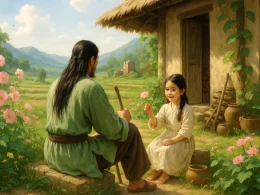"Tell me, where do you live? --
Near here, by the fishing-pool?
Let's hold our boats together, let's see
If we belong in the same town."
Original Poem:
「长干行 · 其一」
崔颢
君家何处住, 妾住在横塘。
停船暂借问, 或恐是同乡。
Interpretation:
This poem captures a brief yet vivid conversation between a young boat girl from the water tThis poem captures a brief yet vivid conversation between a young boat girl from the water towns of Jiangnan and a passing stranger. Through simple and natural dialogue set against the backdrop of an unexpected meeting on the river, the poem reveals the girl’s sincerity and warmth, painting a subtle yet charming picture of life in the southern water villages. Despite its brevity, the poem conveys genuine emotions and carries a strong sense of everyday life, vividly reflecting the simplicity and natural charm of the local people.
First Couplet:“君家何处住,妾住在横塘。”
jūn jiā hé chù zhù, qiè zhù zài héng táng.
May I ask where your home is, good sir? My family lives in Hengtang by the water.
The poem opens with the girl taking the initiative to ask the traveler’s origin. Though it is a casual inquiry, there is a touch of warmth and curiosity behind her words. A chance encounter on the river should make them strangers, yet the girl openly reveals her own home, reflecting the candid and straightforward nature of the water village girls. This opening also plants the seed for further interaction.
Second Couplet:“停船暂借问,或恐是同乡。”
tíng chuán zàn jiè wèn, huò kǒng shì tóng xiāng.
Please pause your boat for a moment so I can ask—perhaps we are from the same hometown.
This couplet serves as both a pretext to continue the conversation and a subtle glimpse into the girl’s feelings. She fears being too forward but is also eager to connect with the stranger, cleverly using the possibility of being "hometown friends" as an excuse to prolong the encounter. In just a few lines, the girl’s personality, emotions, and unspoken hopes are vividly portrayed.
Overall Appreciation
This poem centers on a boat girl from the Jiangnan water villages, using a chance meeting on the river to unfold a natural and slightly shy conversation. The girl is open and bold, unafraid to express her curiosity and goodwill; yet, to maintain propriety, she cleverly introduces the idea of being from the same hometown. This blend of frankness and reserved charm makes the dialogue feel fresh, natural, and full of life. With only four lines, the poem forgoes elaborate imagery or grand themes, relying instead on plain language to vividly capture the girl’s warmth and innocent yearning. The character is lifelike, and the local water-town customs and atmosphere come alive, making the poem a classic example of folk-style poetry.
Writing Features
- Plain Language and Strong Everyday Flavor: The entire poem uses conversational language, perfectly matching the identity of a boat girl, making it authentic and relatable.
- Distinct Characterization: The girl is lively, straightforward, and open, yet also a bit shy and clever, making her personality full and believable.
- Sincere and Subtle Emotions: Though the girl is the one to initiate conversation, there is no sense of impropriety. Her emotions are genuine but restrained, capturing the customs and social dynamics of the water villages.
- Clever Construction with Depth in Simplicity: Using a casual riverside conversation to reveal personality, setting the scene of water-town life through a fleeting encounter, and using the "hometown" excuse to suggest a budding affection — the poem is small in scope but rich in meaning.
Insights
At first glance, this poem depicts a simple riverside conversation, but it also reflects the purest and most sincere emotions found in everyday life. Many of life’s most beautiful moments lie hidden in unexpected encounters and ordinary dialogues. The girl’s honesty, warmth, and natural charm embody the unpretentious customs of her time and the quiet poetry of daily life. This unvarnished sincerity and natural expression remind us to cherish the small joys in life and treasure the most authentic and simple moments we experience.
Poem translator:
Kiang Kanghu
About the poet:

Cui Hao (崔颢), A.D. ? – 754, a native of Kaifeng, Henan Province. He was admitted as a scholar in 723 AD. At that time, Cui Hao was well known, along with Wang Changling, Gao Shi, Meng Haoran, and Wang Wei.











